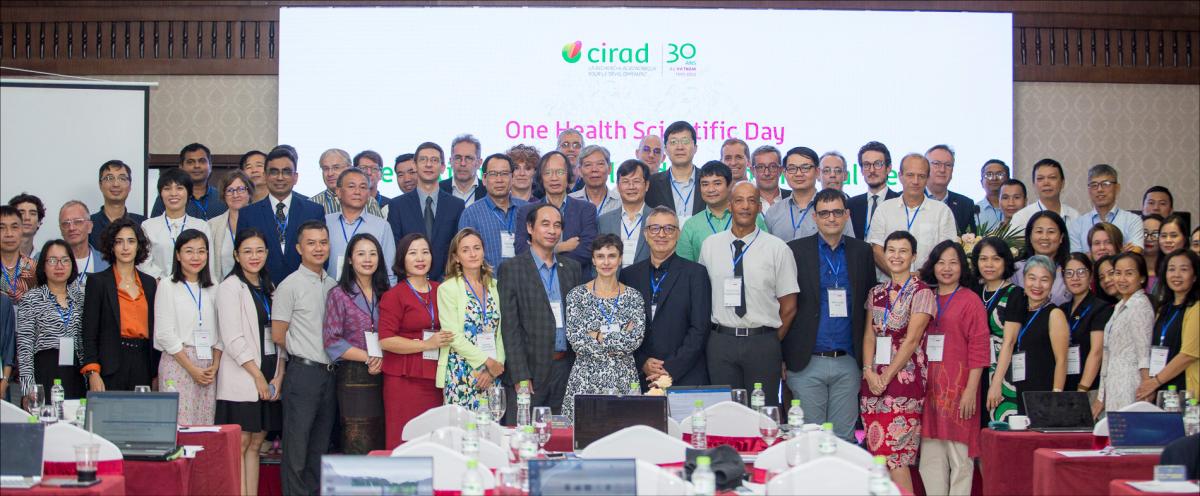- Home
- Worldwide
- Our regional offices
- Continental Southeast Asia
- News : Continental Southeast Asia
- Hanoi’s first One Health Scientific Day
One Health, One Vision: Hanoi’s first One Health Scientific Day

The One Health Scientific Day attracted over 80 experts from across multiple organizations and disciplines. © Viet Hung, CIRAD
As the challenges of climate change and emerging epidemics continue to grow, so does the importance of viewing health from an integrated perspective. The One Health Scientific Day in Hanoi, hosted by Cirad, with the support of the French Embassy, the Vietnamese Academy of Agricultural Science (VAAS), and the Research Institute for Development (IRD), underlines the urgent imperative of unified health strategies. This event emphasized Cirad's efforts in interlinking diverse disciplines and highlighted the pressing need for Vietnam's agricultural sector to integrate holistic health strategies.
A pressing need for interdisciplinary discussion
The conference welcomed participants with an opening panel led by Mr. Olivier Brochet, French Ambassador to Vietnam, Mrs. Elisabeth Claverie de Saint Martin, CIRAD's CEO, and Dr. Dao The Anh, Vice President of VAAS. During her opening remarks, Mrs. Claverie de Saint Martin reflected on the recent COVID-19 pandemic, emphasizing its role in underscoring the importance of preventive strategies in health management. "COVID was a surprise for everybody... it brought to light the need for preventive actions and a broadened perspective on health," she observed in an interview with VTC 16, an agriculture channel.
The conference agenda was vast and varied. Alongside engaging presentations that offered detailed insights into topics ranging from zoonotic infections and antibiotic resistance to ecosystem disruptions, lively round-table discussions fostered dialogue and collective brainstorming. There was a strong emphasis on expanding the traditional understanding of the One Health approach. While commonly perceived within human-animal disease transmission, antibiotic resistance, and food safety, the conference sought to shed light on its lesser-acknowledged aspects, notably plant, soil, and environmental health.
Developing the One Health approach in Vietnam
Given Vietnam's stature as a significant exporter of agricultural products like rice and coffee, understanding the health of the soil and plants becomes paramount to ensuring both domestic food safety and maintaining the quality of exports. "For example, before, the research used to be separated into different, isolated topics," remarked Dr. Dao, "However, when we do fieldwork, we can observe that most farming households engage simultaneously in both plantations and livestock farming." This observation highlights the necessity for integrated capacity programs. As the experts shared their insights, two threads emerged:
- the need for political decision-makers to collaborate with a large number of stakeholders, (farmers, scientists, and environmental organizations) to develop and implement policies that promote plant, soil and environmental health;
- the need for capacity building and broader outreach.
Many pressing issues discussed in the conference - be it soil health, livestock well-being, or sustainable agriculture - require academic understanding, practical application on the ground and specific regulations to promote sustainable agricultural practices. This process remains a significant challenge. Beyond academic and policy circles, the role of the media was underscored as vital.
Bridging the gap between research and its real-world implications, especially in the post-COVID world, requires making scientific findings accessible and actionable. Dr. Nguyen Viet Hung, Co-Leader of the Animal and Human Health Program at the International Livestock Research Institute (ILRI), stated it's essential to "reinforce the role of media in the dissemination of scientific findings to the general public and find methods to convert scientific findings into real-world solutions."


























